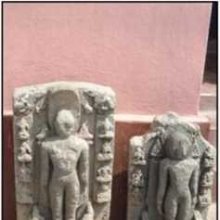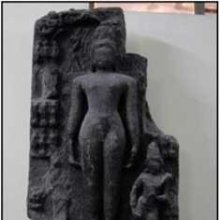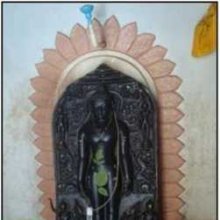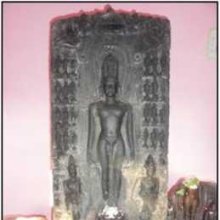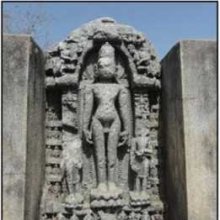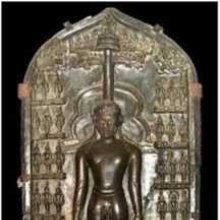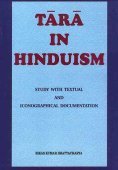Tirthankara, Tīrthaṃkara, Tīrthaṅkara, Tirthamkara: 13 definitions
Introduction:
Tirthankara means something in Jainism, Prakrit, Hinduism, Sanskrit, the history of ancient India, Hindi. If you want to know the exact meaning, history, etymology or English translation of this term then check out the descriptions on this page. Add your comment or reference to a book if you want to contribute to this summary article.
Alternative spellings of this word include Tirthkar.
Images (photo gallery)
(+87 more images available)
In Jainism
General definition (in Jainism)
Source: Wisdom Library: JainismTīrthaṅkara (ऋषभनाथ).— A tīrthaṅkara is an enlightened being who has conquered saṃsāra (cycle of birth and death), leaving behind him a path for others to follow.
Jainism recognizes the following twenty-four tīrthaṅkara :
- Ṛṣabha,
- Ajita,
- Saṃbhava,
- Abhinandana,
- Sumati,
- Padmaprabha,
- Supārśva,
- Candraprabha,
- Puṣpadanta,
- Śītala,
- Śreyāṃsa,
- Vāsupūjya,
- Vimala,
- Ananta,
- Dharma,
- Śānti,
- Kunthu,
- Ara,
- Malli,
- Munisuvrata,
- Nami,
- Nemi,
- Pārśva,
- Mahāvīra,
In Jainism, a Tīrthaṅkara is a human being who helps in achieving liberation and enlightenment as an "Arihant" by destroying their soul-constraining (ghati) karmas, became a role-model and leader for those seeking spiritual guidance. Tirthankara is also said to mean “full moon,” a metaphorical reference to Kevala Jnana, the spiritual state achieved by exalted and rare beings. Jain scriptures define the term tirthankara as follows: the contrivance which help us to cross the great ocean of worldly life is called Tirtha and the person who makes that tirtha is known as tirthankara.
Source: HereNow4U: GlossaryTirthankara (Prakrit: Tirtha = ford ), also called Jina (victor, winner or conqueror), literally meaning 'ford-maker', who (re-)establishes the religion and the Sangh (the four fold order/community of ascetics and lay followers).
The day when a tirthankara was born, got diksha, atteined omniscience and got liberation from the cycle of rebirth, is given in lunar days, so called tithis.
The last Tirtankara known as Mahavira (~ 599 BC), a contemporary of Buddha, and Parshvanatha (~850 BC) found acceptance as historic persons. The appearance of the other 22 predecessors reach for eons.
In Jainism a Tirthankara (he or she) is a liberated soul who has attained omniscience and guides the souls to the opposite shores of the ocean of the world to save them from the cycles of repeated earth existences (rebirth). Tirthankara also are called Jina (vanquisher, victor, conqueror), their followers Jains. To them, a Tirthankara is greater than the gods because he transcends the laws of Space and Time.
Source: HereNow4u: Tīrthaṅkara (ford maker) and Kevalīs (omniscient)Tīrthaṅkara (तीर्थङ्कर).—The 24 Tīrthaṅkara (or Tīrthaṃkara) from Vṛṣabhanātha up to Mahāvīra are arihanta omniscient as well as Tīrthaṅkara. The Tīrthaṅkara and omniscient share same qualities of liberation from bondage and knowledge yet are different. Tīrthaṅkara are the reformers of three worlds. They are capable of self-welfare as well as the welfare of others. They are the benefactors of gods, demons, humans, animals and birds.
Source: Encyclopedia of Jainism: Tattvartha Sutra 8: Bondage of karmasTīrthaṅkara (तीर्थङ्कर, “ford-maker”) refers to one of the various kinds of Nāma, or “physique-making (karmas)”, which represents one of the eight types of Prakṛti-bandha (species bondage): one of the four kinds of bondage (bandha) according to the 2nd-century Tattvārthasūtra chapter 8. What is meant by fordmaker (tīrthaṅkara) body-making karma? The rise of which causes the status of an arhat and the founder cum preacher of the creed is called fordmaker body-making karma.
Source: Encyclopedia of Jainism: Tattvartha Sutra 6: Influx of karmasTīrthaṅkara (तीर्थङ्कर) refers to “ford-maker” according to the Tattvārthasūtra chapter 6.—Who is a ford-maker (tīrthaṅkara)? An omniscient that organizes propagates and preaches the creed (tīrtha) is called fordmaker. He takes the followers from the shores of ignorance to the shores of enlightenment. How many auspicious events in life are there of a fordmaker (tīrthaṅkara)? They can have two, three or five auspicious events (kalyāṇakas) in their life.

Jainism is an Indian religion of Dharma whose doctrine revolves around harmlessness (ahimsa) towards every living being. The two major branches (Digambara and Svetambara) of Jainism stimulate self-control (or, shramana, ‘self-reliance’) and spiritual development through a path of peace for the soul to progess to the ultimate goal.
India history and geography
Source: Cologne Digital Sanskrit Dictionaries: Indian Epigraphical GlossaryTīrthaṅkara.—(CII 3; EI 9); epithet of the 24 great leaders of the Jain faith; propagator of the Jain faith or tīrtha; creator of the four sections, viz. monk, nun, layman and laywoman (sādhu, sādhvī, śrāvaka and śrāvikā); same as Jina; sometimes spelt Tīrthakara; also called Ādikartṛ. Note: tīrthaṅkara is defined in the “Indian epigraphical glossary” as it can be found on ancient inscriptions commonly written in Sanskrit, Prakrit or Dravidian languages.

The history of India traces the identification of countries, villages, towns and other regions of India, as well as mythology, zoology, royal dynasties, rulers, tribes, local festivities and traditions and regional languages. Ancient India enjoyed religious freedom and encourages the path of Dharma, a concept common to Buddhism, Hinduism, and Jainism.
Languages of India and abroad
Sanskrit dictionary
Source: Cologne Digital Sanskrit Dictionaries: Monier-Williams Sanskrit-English DictionaryTīrthaṃkara (तीर्थंकर):—[=tīrtha-ṃ-kara] [from tīrtha > tīra] m. = -kṛt, [Jaina literature]
Source: DDSA: Paia-sadda-mahannavo; a comprehensive Prakrit Hindi dictionary (S)Tīrthaṅkara (तीर्थङ्कर) in the Sanskrit language is related to the Prakrit word: Titthaṃkara.
[Sanskrit to German]
Sanskrit, also spelled संस्कृतम् (saṃskṛtam), is an ancient language of India commonly seen as the grandmother of the Indo-European language family (even English!). Closely allied with Prakrit and Pali, Sanskrit is more exhaustive in both grammar and terms and has the most extensive collection of literature in the world, greatly surpassing its sister-languages Greek and Latin.
Hindi dictionary
Source: DDSA: A practical Hindi-English dictionaryTīrthaṃkara (तीर्थंकर) [Also spelled tirthkar]:—(nm) the twenty-four leading religious preceptors of Jainism, the last of them being Lord Mahavir.
...
Kannada-English dictionary
Source: Alar: Kannada-English corpusTīrthaṃkara (ತೀರ್ಥಂಕರ):—[noun] any of the twenty-four highest religious teachers of Jaina religion.
Kannada is a Dravidian language (as opposed to the Indo-European language family) mainly spoken in the southwestern region of India.
See also (Relevant definitions)
Partial matches: Kara.
Starts with: Tirthamkaratva, Tirthankaradatta.
Ends with: Aditirthamkara.
Full-text (+561): Rishabhadeva, Rishabha, Tirthakara, Parshvanatha, Simhasena, Jayashyama, Arishtanemi, Caturvimshatitirthamkarapuja, Sugriva, Tirthanatha, Tirthapravartaka, Caturvimshati-tirthankara-patta, Kalpasutra, Shyama, Anantanatha, Vishvasena, Sushena, Padmavati, Mahavira, Ayodhya.
Relevant text
Search found 30 books and stories containing Tirthankara, Tīrthaṃkara, Tīrthaṅkara, Tirthamkara, Tirtham-kara, Tīrthaṃ-kara; (plurals include: Tirthankaras, Tīrthaṃkaras, Tīrthaṅkaras, Tirthamkaras, karas). You can also click to the full overview containing English textual excerpts. Below are direct links for the most relevant articles:
Yogadrstisamuccaya of Haribhadra Suri (Study) (by Riddhi J. Shah)
Appendix: Tīrthaṅkaras in Jainism—A Study
Chapter 3.1 - Yogadṛṣṭisamuccaya (Benedictory Verse) < [Chapter 3 - Introduction to the Yogadṛṣṭisamuccaya]
Chapter 4.4c - Tattvaśravaṇa (attentive listening to doctrinal matters ) < [Chapter 4 - The Eight Yogadṛṣṭis and the nature of a Liberated Soul]
Jain Remains of Ancient Bengal (by Shubha Majumder)
Jain Aṣṭāpadatīrtha Sculptures < [Chapter 6 - Iconographic Study of Jaina Sculptural Remains]
Jain images from Ancient Bengal (Introduction) < [Chapter 6 - Iconographic Study of Jaina Sculptural Remains]
Meaning of Tīrthaṅkara < [Chapter 1 - Introduction and Scope of the Present Study]
The validity of Anumana (inference) in Nyaya system (by Babu C. D)
A study of the philosophy of Jainism (by Deepa Baruah)
Chapter I.b - Meaning of the term Tīrthaṅkara < [Chapter I - Introduction]
Chapter I.a - Historical background of Jainism < [Chapter I - Introduction]
Chapter I.c - The lives of the Tīrthaṅkaras < [Chapter I - Introduction]
Jainism in Odisha (Orissa) (by Ashis Ranjan Sahoo)
Jaina images of Jamunda at Jeypore District Museum < [Chapter 3: Survey of Jaina Antiquities in Odisha]
Jaina Antiquities in Ayodhya (Balasore) < [Chapter 3: Survey of Jaina Antiquities in Odisha]
Jaina images at Kapilesvara Temple, Nuadhana < [Chapter 3: Survey of Jaina Antiquities in Odisha]
Matangalila and Hastyayurveda (study) (by Chandrima Das)
Elephants in Jain Mythology < [Chapter 4]
Related products
